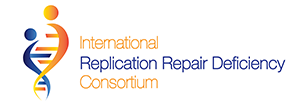Management of Patients with CMMRD or RRD
Diagnosis
The first important step is to establish a correct diagnosis of CMMRD or RRD.
This diagnosis must be made by a genetic counsellor/medical geneticist and involve counselling of family members.
The initial diagnostic screening for CMMRD includes immunohistochemical (IHC) analysis for MLH1, MSH2, MSH6 and PMS2 protein expression in tumours. Additionally, loss of expression of the same protein and negative staining pattern for the corresponding protein by IHC is seen in normal cells contained within tumours.
Confirmation of a diagnosis of CMMRD must be done through identification of a germ-line mutation in one of the MMR genes.
Since many of the mutations in the MMR genes are not well characterized and PMS2 sequencing is challenging, functional and additional assays were recently developed. This enables a diagnosis to be established based on clinical and molecular data in a more rapid fashion and allows for counselling, adequate surveillance and therapy to patients and family members.
The Consortium provides recommendations for the treating team and counselling for patients with respect to the diagnosis of CMMRD and in specific cases can perform diagnostic tests as needed.
Please contact us directly for additional consultation if a diagnosis is unclear.
Patient Management
Once diagnosis of CMMRD is made (either genetically or clinically/molecularly) the surveillance protocol should be initiated as quickly as possible. CMMRD patients and their heterozygous family members (Lynch syndrome) should both adhere to the appropriate surveillance recommendations.
Guidelines for surveillance are changing consistently and are updated by the Consortium regularly.
Individuals with Lynch syndrome benefit from a strict Lynch syndrome surveillance protocol and from preventive colectomy. Therefore, a CMMRD diagnosis may benefit parents and other family members.
Read the latest version of the CMMRD surveillance protocol.
Management of CMMRD Cancers
Once a diagnosis of a CMMRD or RRD cancer is confirmed, several specific issues need to be considered:
- Before starting therapy, assessment for the presence of other cancers is imperative since some CMMRD patients may have concurrent cancers and this may affect the treatment plan. A PET-CT scan can detect most malignant CMMRD tumors and could be used as a single tool in case of time restraints.
- Most CMMRD cancers respond to therapy similar to sporadic cancers from the same tissues. In contrast to other cancer predisposition syndromes such as Fanconi anemia and Gorlin syndrome, excess toxicity from chemotherapy and radiation treatments are uncommon.
- Monitoring during therapy should include the regular surveillance protocol, as additional cancers could occur in a metachronous fashion and could be treated if detected early.
Novel therapies
Several groups including the International RRD Consortium are working on the discovery of novel therapies for patients with CMMRD and RRD cancers. More information can be found on the research page.
Immune checkpoint inhibition has recently shown to have encouraging responses in CMMRD brain and gastrointestinal tumors.
We recommend that you consider joining one of our clinical trials using immune checkpoint inhibitors and/or contacting our team before starting any such therapy.
Clinical Data Collection and Biorepository
The International RRD Consortium collects data on surveillance, treatment and outcome of patients on a variety of tumors as well as biological material from our patients and family members for clinical and research testing.
This data is shared with physicians or other caregivers as needed.
If you have further questions about or require assistance in the diagnosis of CMMRD or management of your patient, please contact us directly.
